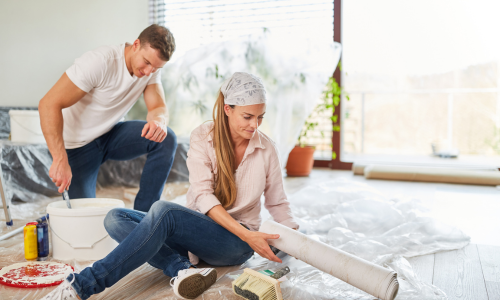
The longer, lighter, and warmer days of spring are perfect for preparing your home for summer. Whether you are moving, improving, or want to make the most of your home, there are lots of things you can do that, more often than not, add value to your home. With a 22%* uplift in the number of homes listed for sale compared to the beginning of last year, the market is moving to sunnier climbs.
Have a good spring clean
A great place to start and perhaps not the most exciting aspect of preparing your home for summer, a good deep clean is well worth the effort. De-cluttering will allow you to take in your home’s features and spaces, which may help inspire a few changes. Cleaning your home allows you to reconnect with it. As you store away accumulated unnecessary items, clean out closets, and dust those hard-to-reach places, you will more easily discover any blemishes or maintenance issues that need attention. If you don’t have hired help or loved ones to help you, play some tunes to energise you.
Take some pictures
Your phone is perfect for creating a to-do list. Take pictures of all those little issues that need addressing. Start at the front, then work your way around every room in the house to the garden. Add notes or record ideas you may have. For example, is the guttering in need of cleaning? Does the front of your home need painting? Are there scuff marks or patches of paintwork that need touching up? From grouting in your bathroom to weeds sneaking up between the patio, leave no stone uncovered. If your home looks a picture, it will be a nicer place to live and more appealing to buyers.
Improve your home’s outdoor spaces
Whether you are adding a hot tub, a heated pool, a play area for the dogs, or simply painting the shed to make it look a few years younger, your garden and outdoor areas take centre stage during the summer. Adding new plants and making space for daffodils, cleaning the barbecue, or weeding will add vibrancy to your garden. If you are starting from scratch or making small improvements, defining your seating, dining, working, and entertaining areas will have a big impact. With wooden decking, stones, free-standing structures, grass, trees, and an eternal array of ideas, deciding what to do can be the hardest part.
Swap out winter themes for summer
It’s unlikely you'll need the fire during the summer months, although the UK weather is uncertain. Instead of logs, add flowers to your hearth. Swap brightly coloured throws to replace wintry themes. Allow more sunlight to enter your rooms by replacing curtains and keep cool with thermal blinds. Rearranging your furniture and perhaps scaling back a bit will create more space. Bring the scent of summer to your home with candles, herbs, and plants. Adorning your hallway with seasonal flowers will set the tone from the moment you enter your home, and planting pots at the front will give you a summery welcome.
Capture the essence of summer
Think about cooling and ventilation. Is it worth installing air conditioning or adding fans? Create spaces that capture those magical moments of summer. Strategically place your furniture outside and inside to capture the sunset and a special place in the shade for when it becomes too hot. Eggshell chairs and hammocks are ideal for this. Decide where you are putting the ice bucket, designate a place for sun cream, plan your barbeque area, and wash any soft furnishings for outdoor dining or sunbathing. Make your own outdoor pizza oven, build a bar, or hire a landscape gardener and start building the dream from scratch.
A better home could be around the corner so book a valuation today